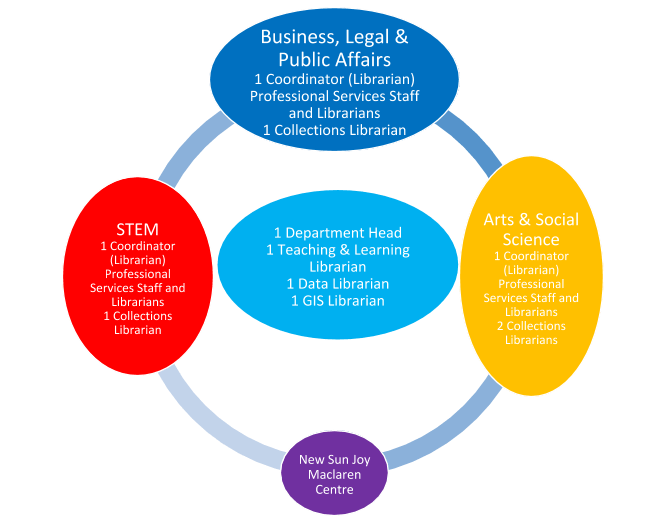
Carleton University Library undergoes changes to its Academic Services
By Amber Lannon
Carleton University is located in Ottawa, on a beautiful campus in the south of the city bordered on one side by the Rideau Canal and on the other by the Rideau River. A comprehensive university with 30,000 students and close to 1000 faculty, Carleton is supported by one library. The MacOdrum Library is home to 110 staff (25 Librarians and 85 Professional Services Staff) as well as several student service partners, and has been in a constant state of renovation since 2012.
In 2014, the library began a review of its public services with a group of 15, including both Professional Services Staff and Librarians, selected by senior management. The Public Services Review Group (PSRG), with the support of Carleton’s Office of Quality Initiatives, studied the library’s public services with an aim to making them more user-centered. For two years, they gathered data and analyzed current operations, resulting in the 17 recommendations that follow.
PSRG recommendations
1. Operational Effectiveness
- Amalgamate Reference Services and Maps, Data, and Government Information (MADGIC) into a single department
- Complete the centralization of MADGIC technical service functions into the Collection Development and Acquisitions (CDA)/Cataloguing and Collection Maintenance (CCM) departments
- Create a full-time Communications Officer position
- Define and formalize internal and external campus partnerships, such as the Centre for Student Academic Support (CSAS) and the Carleton University Research Office (CURO)
- Implement a training and professional development strategy for all staff and student employees
2. Services
- Establish an Information Hub located near the Library entrance
- Reconfigure liaison activities to align with the new operational structure and public service functions
- Establish and define roles for in-depth research support and scholarly communication activities: Create a Scholarly Communications Coordinator librarian position
- Implement OCUL Ask a Librarian virtual reference service
- Review transcription services processes within the New Sun Joy Maclaren Adaptive Technology Centre
3. Teaching and Learning
- Establish and define roles for Teaching and Learning
- Create a Teaching and Learning Coordinator librarian position
- Form a Teaching and Learning Committee chaired by the Teaching and Learning Coordinator
- Establish an e-learning strategy
- Design new teaching spaces and remodel current instruction rooms
4. Collections
- Establish a centralized model for Collection Development
- Implement a partial integration of CODOC collections into the regular collection
A small Implementation Team (IT) of three members formed to operationalize the recommendations. This included the Associate University Librarian for Academic Services, the Manager of Library Administrative Services, and a partner from central Human Resources. The IT started with a series of consultation sessions on the recommendations, then shared a draft implementation plan a few weeks later. The team gathered further feedback on this version before it was finalized, which only took a few short weeks. The plan included a structure for a new department (Figure 1) and the steps the IT would take to establish it, as well as plans for a number of small, agile working groups to implement the rest of the recommendations. For the most part, membership in the working groups was voluntary.

The feedback on the PSRG recommendations included overwhelming concern about library culture. In response, the IT formed a working group on library culture; its mandate was to make short- and long-term recommendations to senior management to improve library culture. This group had no representation from senior management or the IT, so members were free to discuss issues and recommendations. The Committee on Library Organizational Culture (CLOC) met for 10 months, after which they made the following 14 recommendations.
CLOC Recommendations
Diversity, civility and respect
- Develop a code of workplace conduct and a civility statement.
- Develop a formal process for addressing conflict in the workplace, with specific reference to bullying (covert and overt; mild and severe) from a supervisor, a peer or a workplace group.
- Provide Fierce Conversations (or similar training) for staff, and design a plan to integrate respectful conversational practices into normal operations.
- Develop equitable processes for ensuring that all staff have opportunities to participate in library operational committees.
Leadership, vision and planning
- Review the current processes and procedures for defining committee work in the library and revise to ensure that all employee groups are represented equitably on all library committees.
- Provide on-going formal managerial and supervisory training and support (e.g., mentorship) for supervisors and department heads. This essential training could be developed in-house and/or leverage existing university programs.
Internal communications
- Create a central portal for all communications material distributed to library staff, and make this the authoritative location for shared information.
Employee growth and opportunities
- Establish a working group to look at current practices for providing feedback, mentoring, and recognition.
- Design and implement a process for identifying and reviewing individual staff goals for job-related growth and learning opportunities. This process is separate from the process of performance review.
Operational transparency and accountability
- Develop a process for clearly articulating mandates and service levels for individual units and projects.
- Develop clear and transparent processes for choosing library operational committee members.
- Support the continued involvement of staff in the strategic planning process.
Teamwork
- Collectively define expectations and good practices for collaboration, team and committee work such as clear mandates, a range of membership models, transparent communication within and from a team, and articulated roles.
- Continue to support and build on formal and informal activities designed to strengthen teamwork and provide supplemental resources as required.
Unexpected events resulted in a stretched timeline: for example, a labor dispute between the university and its CUPE employees had significant impact, as 85 library employees were on strike for five and a half weeks. The implementation process was paused during the strike, as well as the weeks leading up to and following it. Other delays were caused by a university- and union-mandated review of all CUPE positions, bottlenecks and unexpected events in hiring processes, and departures of people in key public service positions.
Two years later, 80 percent of the PSRG recommendations are operationalized, with some fully completed and some still in transition. The CLOC recommendations are also being implemented, and we hope to complete them spring 2019. We cannot make any conclusions about the effectiveness of the implementation yet, as we have not yet evaluated our process or the impact of the recommendations and changes on users and staff; evaluations are planned for 2019.
Amber Lannon has been the Associate University Librarian – Academic Services, Carleton University Library, since July 2016. She can be reached at amber.lannon [at] carleton.ca.


